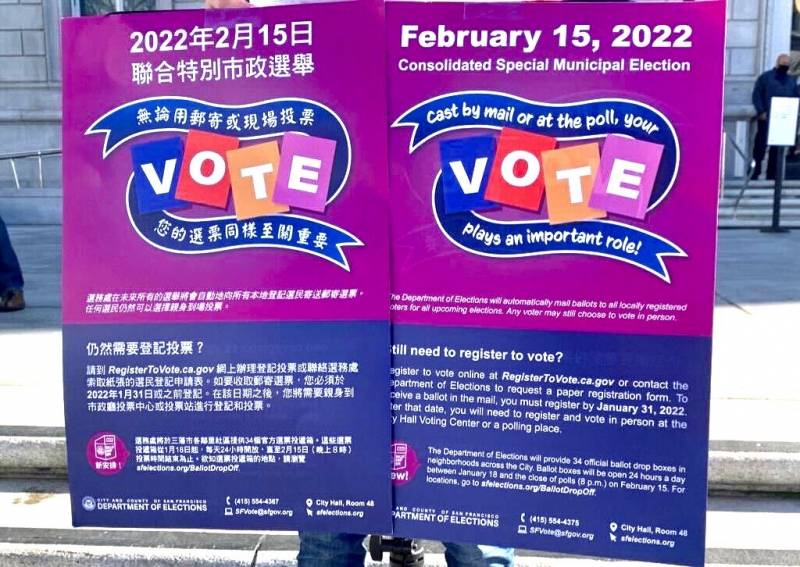Here's a summary of the three contests on the ballot:
SFUSD school board recalls
Three members of San Francisco's Board of Education — Alison Collins, Gabriela López and Faauuga Moliga — are facing recalls. The recall questions about each member appear separately on the ballot.
Noncitizen parents also are allowed to vote on this issue. Here's how to vote as a noncitizen parent if you have a child in the district.
How did the traditionally overlooked school board become the focus of intense political debate?
Here's a timeline of key events that led to the recalls.
Supporters of the recalls gathered tens of thousands of signatures to put the political fate of Collins, López and Moliga on the ballot — arguing that the three displayed incompetence in their management of reopening classrooms, the district's budget and the renaming of dozens of schools, and that Collins's derogatory tweets aimed at Asian Americans and subsequent lawsuit against the board are further grounds for her removal. Recall advocates say new board members are needed to face the immediate challenges of picking a new superintendent and ensuring fiscal stability.
Opponents of the recall say the campaign is pulling attention away from the district's students just months before a regularly scheduled election. Allies of the board members say the recall is trying to depose three officials who have delivered gains for Black and Latino students, such as diversifying Lowell High School by moving away from a merit-based admissions policy. A successful recall, opponents say, will remove voter control of the school board by giving Mayor London Breed her pick of replacement board members.
Dive deeper into the key issues at stake in the school board recall by listening to an election preview on The Bay.
State Assembly, District 17
Only voters on San Francisco's east side, including neighborhoods like the Mission, Castro and Bayview, will vote in this election for state Assembly.
The seat opened up when four-term Assemblymember David Chiu was appointed city attorney. Four Democrats jumped in the race to replace Chiu: former Supervisor David Campos, current Supervisor Matt Haney, entrepreneur Bilal Mahmood and City College trustee Thea Selby.
If no candidate receives a majority of votes, a runoff between the top two finishers will be held on April 19. This seat also will be on the ballot in June, when candidates can run for a full term in a slightly redrawn district.
Campos, who narrowly lost a run for this seat in 2014, most recently served as chief of staff to District Attorney Chesa Boudin. He comes from the progressive flank of San Francisco's Democratic Party, and has been endorsed by local and state teachers unions. Campos said the first bill he would introduce in the Assembly would be legislation to pursue a single-payer health care system in California, an idea that recently stalled in the Assembly.
Haney has served on the Board of Supervisors since 2019, representing neighborhoods including SOMA and the Tenderloin. Before that, he was a member of the San Francisco school board. Unions representing construction trade workers are supporting Haney, who has promised to support laws making it harder for local governments to block new housing from being built. Like Campos, Haney supports only the recall of school board member Alison Collins.
Mahmood founded the analytics start-up ClearBrain and previously worked in the Office of Innovation and Entrepreneurship in the Obama administration. His plans to ease housing development have earned him the endorsement of San Francisco's YIMBY group. In a candidate debate focused on public education, Mahmood was the only candidate to unequivocally support mandating vaccines for California schoolchildren, with no exemption for personal beliefs.
Selby has touted herself as the "public safety" candidate in recent weeks, citing her work in starting the Lower Haight Merchants and Neighbors Association and local art walks to boost foot traffic and improve neighborhood safety. Now, Selby serves on the board of trustees of City College of San Francisco, which oversees the community college. Selby and Mahmood support the recall of all three school board members.
Assessor-recorder
San Francisco's current assessor-recorder, Joaquín Torres, was appointed by Breed in January 2021 and now must go before voters in the first city election since he was picked for the job.
The assessor-recorder is in charge of the city's property tax system — assessing the value of residential and commercial units and also maintaining city records.
Torres, who is running unopposed, wrote in the official Voter Information Pamphlet that he has brought "values of hard work, a focus on people, and expanding opportunity" to the department.
